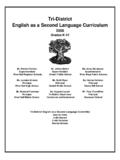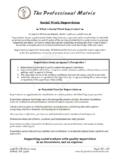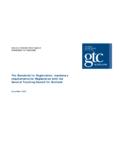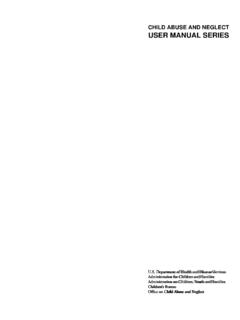Transcription of Tri-District Library/Information Literacy Curriculum
1 Tri-District Library/Information Literacy Curriculum 2011 Grades K - 12 Mr. Patrick Fletcher Superintendent River Dell Regional Schools Ms. Lorraine Brooks Principal River Dell High School Mr. Richard Freedman Principal River Dell Middle School Dr. Maria Nuccetelli Interim Superintendent Oradell Public School Mr. Scott Ryan Principal Oradell Public School Ms. Antoinette Capodanno Tri-District Supervisor Curriculum and Instruction Dr. Tova Ben-Dov Superintendent River Edge Public Schools Ms. Denise Heitman Principal Cherry Hill School Mr. Tony Vouvalides Principal Roosevelt School Library/Information Literacy Committee Barbara Connolly Jennifer Kasyan Laura Fleming Mary Kay Risi Wendy Rosenzweig Oradell, River Dell and River Edge Public School Districts 2 Library/Information Literacy Curriculum Grades K 12 Approved June 22, 2011 TABLE OF CONTENTS Introduction o Mission Statement o Philosophy o Roles of the School Librarian o Units of Study K-6 o Units of Study 7-12 o Resources Appendix A: River Dell 7-12 Content Standards and Student Objectives Appendix B: Curriculum Standards.
2 National information Literacy Standards - Standards for the 21st-Century Learner Cross-Referenced New Jersey Core Curriculum Content Standards in English Language Arts Appendix C: AASL Standards Appendix D: K-6 Curriculum Matrix Appendix E: Core Common Standards: ELA K-12 Appendix F: Technology Standards Appendix G: Standards for the 21st Century Learner Prepared by Barbara Connolly, School Librarian, River Dell High School Mary Kay Risi, School Librarian, River Dell Middle School Wendy Rosenzweig, School Librarian, Roosevelt School Laura Fleming, School Librarian, Cherry Hill School Jennifer Kasyan, School Librarian, Oradell Public School Oradell, River Dell and River Edge Public School Districts 3 Library/Information Literacy Curriculum Grades K 12 Approved June 22, 2011 MISSION STATEMENT The mission of the information Literacy Curriculum is to prepare River Edge, Oradell, and River Dell students to become skilled users of resources, ideas, information and other intellectual properties.
3 The School library information Literacy Program promotes a love of reading and supports students in their personal and academic reading needs. The School library is a unique instructional setting in which trained and certified School Librarians collaboratively design and implement instructional strategies to ensure that students master the critical skills of information Literacy . Although it is impossible to predict precisely the ways in which digital technology will continue to change the way our students access and use information , it is worth noting that the River Edge, Oradell, and River Dell Regional School Districts believe that at this time there remains a vital role for print information resources in the education of our students. It is critical that all stakeholders in the River Edge, Oradell, and River Dell Regional School Districts, including the Boards of Education, administrators, teachers, and information and technology specialists, stay abreast of the constantly changing information environment as it relates to the education of our students.
4 The national standards for information Literacy are defined in Standards for the 21st-Century Learner published by the American Association of School Librarians (AASL), a division of the American library Association ((ALA). These skills are integrated throughout the New Jersey Core Curriculum Content Standards and the national Common Core Standards. Since library information Literacy is contingent upon the library Media Specialists collaborating with classroom teachers, the application of the AASL national standards is somewhat different than all the other state and national curricular standards. We have based our standards on the four broad standards of the AASL. (SEE APPENDICES) It is imperative that information Literacy and library skills are integrated across the Curriculum .)
5 PHILOSOPHY Philosophy of library information Literacy The School library is the vital and integral teaching and learning hub of the school and as a result reflects the philosophy and goals of the School and the district . In the information age, acquiring information Literacy skills and a commitment to lifelong reading and learning are paramount. The School Librarian, in collaboration with classroom teachers, guides students in developing critical thinking, problem solving, and communication skills as they search for, access and evaluate a variety of resources to meet the demands of the 21st century Curriculum . The School library information Literacy program does not exist in isolation. information Literacy skills are interwoven in all academic disciplines.
6 information inquiry conducted under the guidance of the library Media Specialists should occur in all content areas. The School Librarian works in partnership with students, teachers, administrators, board of education Oradell, River Dell and River Edge Public School Districts 4 Library/Information Literacy Curriculum Grades K 12 Approved June 22, 2011 members, and the school community to develop the School library information Literacy Curriculum . The School library information Literacy Program incorporates the goals and objectives of the New Jersey Core Curriculum Content Standards (NJCCCS) and the national Standards for the 21-Century Learner. The combined vision supports the goal of educational excellence and the concept of intellectual freedom.
7 The guiding principles of the Tri-District information Literacy Curriculum are contained in the AASL Standards for the 21-Century Learner. Underlying the philosophy of the Tri-District library information Literacy program are the following Common Beliefs that anchor the national standards. Reading is a window to the world. o Reading is a foundational skill for learning, personal growth, and enjoyment. The degree to which students can read and understand text in all formats ( , picture, video, print) and all contexts is a key indicator of success in school and in life. As a lifelong learning skill, reading goes beyond decoding and comprehension to interpretation and development of new understandings. Inquiry provides a framework for learning.
8 O To become independent learners, students must gain not only the skills but also the disposition to use those skills, along with an understanding of their own responsibilities and self-assessment strategies. Combined, these four elements build a learner who can thrive in a complex information environment. Ethical behavior in the use of information must be taught. o In this increasingly global world of information , students must be taught to seek diverse perspectives, gather and use information ethically, and use social tools responsibly and safely. Technology skills are crucial for future employment needs. o Today s students need to develop information skills that will enable them to use technology as an important tool for learning, both now and in the future.
9 Equitable access is a key component for education. o All children deserve equitable access to books and reading, to information , and to information technology in an environment that is safe and conducive to learning. The definition of information Literacy has become more complex as resources and technologies have changed. o information Literacy has progressed from the simple definition of using reference resources to find information . Multiple literacies, including digital, visual, textual, and technological, have now joined information Literacy as crucial skills for this century. The continuing expansion of information demands that all individuals acquire the thinking skills that will enable them to learn on their own. Oradell, River Dell and River Edge Public School Districts 5 Library/Information Literacy Curriculum Grades K 12 Approved June 22, 2011 o The amount of information available to our learners necessitates that each individual acquire the skills to select, evaluate, and use information appropriately and effectively.
10 Learning has a social context. o Learning is enhanced by opportunities to share and learn with others. Students need to develop skills in sharing knowledge and learning with others, both in face-to-face situations and through technology. School libraries are essential to the development of learning skills. o School libraries provide equitable physical and intellectual access to the resources and tools required for learning in a warm, stimulating, and safe environment. School librarians collaborate with others to provide instruction, learning strategies, and practice in using the essential learning skills needed in the 21st century. ("Standards for the 21st-Century"; see Appendices) information and technology skills are most meaningful when learned within a subject area, within an interdisciplinary unit, or within a unit which addresses an authentic, real-life need or problem.








